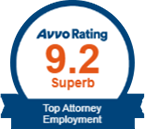Disability Discrimination Lawyer in NYC & NJ
Excellence in Protecting Your Rights – Fight Disability Discrimination
NYC & NJ Disability Discrimination Attorney
An employer is not allowed to discriminate against any individual due to their disability, which can manifest in various ways, such as physical disability, speaking or hearing impairments, vision difficulties, mobility limitations, learning challenges, and other conditions like alcoholism and depression. In cases where a person is able to fulfill a job role with reasonable accommodations, it is mandatory for the employer to make a reasonable effort to facilitate those accommodations. Employers are prohibited from penalizing, terminating, or mistreating employees due to their disability or their request for accommodation.
According to the U.S. Equal Employment Opportunity Commission (EEOC), disability discrimination occurs when an employer treats a qualified individual unfavorably because of their disability. This also extends to instances where an individual has a history of a disability or is believed to have a physical or mental impairment. The law mandates employers to provide reasonable accommodation to employees or job applicants with disabilities, unless it causes significant difficulty or expense for the employer (referred to as “undue hardship”).
The law prohibits discrimination in all aspects of employment, including hiring, firing, pay, job assignments, promotions, and training. Harassment based on an individual’s disability is also illegal, including offensive remarks or behaviors that create a hostile work environment.
Reasonable accommodation may include modifying the work environment or job duties to enable a person with a disability to apply for a job, perform job tasks, or enjoy employment benefits. Employers are not obliged to accommodate an employee solely for caregiving purposes, but the Family and Medical Leave Act (FMLA) may necessitate certain accommodations.
An employer may deny an accommodation if it causes undue hardship, considering factors such as the employer’s size, financial resources, and business needs. Medical inquiries and exams are limited to specific stages of the employment process, and employers must keep all medical information confidential.
Employment discrimination cases do not always require direct evidence, as circumstantial evidence that indicates discriminatory motives can suffice. The burden of proof may shift between the plaintiff and the employer, with the plaintiff required to demonstrate weaknesses in the employer’s reasons for termination or disciplinary action.
While many discrimination cases are won in state courts, some may be dismissed on summary judgment before reaching a jury.
If you need a qualified disability discrimination attorney, please review the available case types below:
- Americans with Disabilities Act
- Disability Discrimination
- Disability Discrimination & Harassment
- Disability Discrimination & Reasonable Accommodation / Undue Hardship
- Disability Discrimination & Work Situations
- Disability-Related Questions & Medical Exams After A Job Offer For Employment
- Disability-Related Questions & Medical Exams During Employment Application & Interview Stage
- Disability-Related Questions & Medical Exams For Persons Who Have Started Working As Employees
- Rehabilitation Act
If you have experienced disability discrimination in the workplace, do not hesitate to assert your rights. Contact our employment discrimination attorney today to schedule a confidential consultation with an experienced disability discrimination attorney. Let us help you pursue the justice and compensation you deserve.



